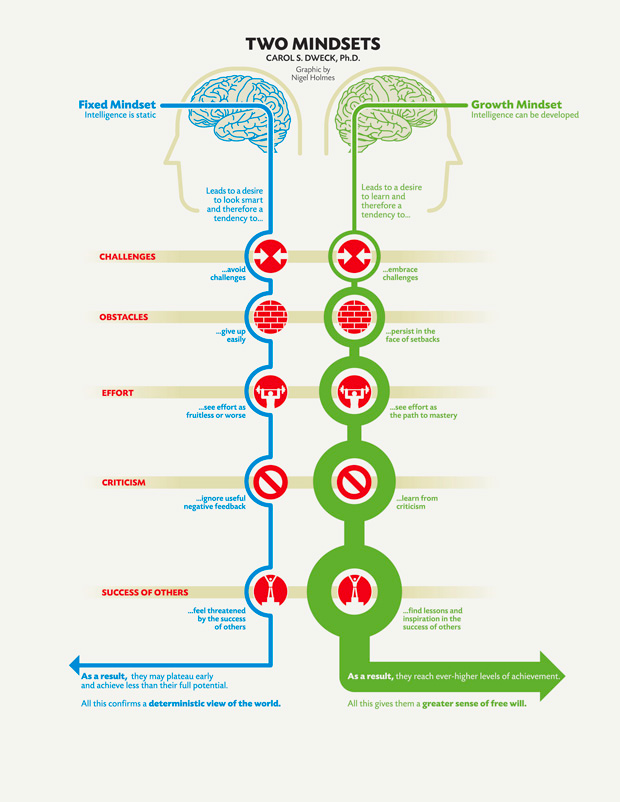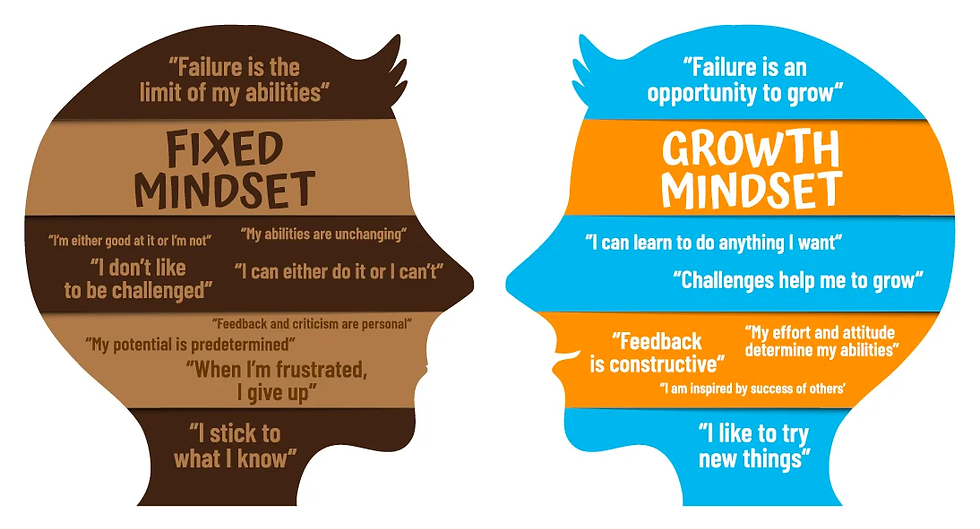Unlock your Potential by Cultivating a Growth Mindset
- Ananya
- Sep 5, 2023
- 5 min read

Contrary to the beliefs of 20th century scientists - despite how obvious it may sound now - human intelligence is capable of adapting, learning, and evolving. This ability is paramount to personal and professional success. The very idea that our intelligence and our capacities aren’t set in stone is a transformative force of motivation in itself that has gained traction in recent years. As I mentioned in my post about neuroplasticity, coined by psychologist Carol Dweck, a growth mindset is the theory that intelligence, talents, and abilities can be developed through dedication, perseverance, and practice. Embracing this capacity offers a variety of benefits that are integral to success, so, today we delve into the benefits of cultivating a growth mindset and explore actionable strategies to help you foster this mindset for your own personal growth.
A growth mindset lays a foundation for invaluable continuous improvement, resilience, and success. Unlike the traditional belief of a fixed mindset (which views abilities as static traits) that has been greatly challenged with today’s discoveries, a growth mindset allows us to view challenges not as boulders but as doors for opportunity of learning and growth. Having a growth mindset goes beyond mere belief that you are capable of working for your intelligence, and rather, focuses more on your daily implication and involvement of this belief. For example, how you approach a challenging or foreign situation in its entirety becomes a whole different ball game. The benefits of a growth mindset are numerous and widely span aspects of our daily lives:

1. Embracing challenges: among the greatest capacities and perspectives that this mindset imparts is our ability to confront challenges rather than shying away from the prospect of struggling. Welcoming challenges as chances to develop new skills and expand our capabilities honestly feels so much more gratifying and easier than panicking at the sight of a challenge. My parents always tell me “everything happens for a reason” as though it’s part of some divine plan, and my response has always been one of immediate dismissal because why would someone confront me with a challenge if there’s a reason for it? Because there are better things in store. You may not see it for a while, but with determination, you will find the alternative that’s even more right for you.
2. Effort and Persistence: a growth mindset encourages a stronger work ethic and perseverance. For decades, scientists and communities spoke so certainly of our abilities being set in stone, so, in the face of adversity, if your abilities are already predetermined, why would anyone even work to be better when that’s not possible? With the understanding and scientific backing of the growth mindset, setbacks are not borders we cannot cross, and rather a time to persist and find alternative solutions.
3. Learning from Failures: rather than seeing failure as a sign of inadequacy that you can never overcome, this mindset enables individuals to extract valuable lessons from their failures, allowing us to resiliently improve and refine our approaches. In all honesty, I’m not sure what the fixed-mindset believers ever based their theories off on, considering this potential for self-improvement is the very basis of education and the educational system.
4. Increased resilience: beyond academic intelligence, a growth mindset enhances emotional resilience. When faced with constructive criticism or setbacks, individuals with this mindset are more likely to maintain their confidence and self-esteem because they do not see it as a personal attack or commentary, but rather, an opportunity to improve themselves. I promise you it is exponentially easier to be receptive than to be in denial of constructive criticism, but destructive criticism is a whole other story.
5. Openness to feedback: people with a growth mindset actively seek feedback as a means to improve rather than a critique of your character. Those with this mindset are seen to be more likely to maintain their confidence and self-esteem. Being willing to learn and be better is inextricable to success, particularly in collaborative environments. Embrace feedback, whether positive or constructive, as a tool for growth. Use it to refine your approach and make informed decisions moving forward.

Now, we understand the benefits of it in theory. Nonetheless, it is no easy feat or switch-flip to transform your mindset. It requires profound self-awareness. By recognizing your current mindset (something you can do using a questionnaire within the first few pages of Carol Dweck’s novel) and asking yourself whether you are more inclined to believe that abilities and fixed, or whether you rather embrace the idea of growth and development? By even recognizing that your inclination is that described in the former, you take your first step in developing a growth mindset: acknowledging a challenge and taking it head on. Self-awareness is the first step of this transformation.
The very decision to step out of your comfort zone to tackle this challenge of transforming your mindset is one that stretches your abilities: an essential component of growth mindsets. Embracing new experiences like this, even if they lead to temporary discomfort, fosters growth and adaptability. There is no downside to learning something new, not even a loss of time. Learning is inherently invaluable.
Additionally, while it is certainly easier set than done, we must actively work to view setbacks as learning opportunities. Make this train of thought a habit; you may have to do this actively and forcibly at first, but eventually, a habit emerges! Instead of dwelling on the failure, reflect on the gap you could’ve fulfilled by asking yourself “what can I take away from this experience to improve in the future?”. By recognizing what you do wrong, not only do you embrace a growth mindset, but you prevent yourself from repeating the same mistake that cost you in the first place. You may not have mastered something yet, but as a human being, your brain is built to adapt and learn through its neuroplasticity, thus in spite of any negative inner dialogue, science makes that fact that you are capable of learning to be indisputable.
We often learn best through rewarding ourselves, so by shifting our focus from solely celebrating outcomes to even acknowledging the effort we put in, you harness the power of psychology to develop and optimize our mindset for success. Progress is a journey, and each step forward is a victory in its own. Through effort, we cultivate a love for learning by seeking out new knowledge and skills. Whether it's through formal education, online courses, or self-study, the pursuit of knowledge is a cornerstone of a growth mindset.
Cultivating a growth mindset is a journey that requires self-awareness, dedication, and a willingness to embrace challenges. By adopting this transformative way of thinking, you can unlock your full potential, adapt to the ever-changing world around you, and continuously evolve into the best version of yours. Especially in a post-pandemic world, we’ve come to realize the true significance of being resilient in the face of life's adversity. So, why wait? We all want to succeed, and a mindset change is the first step to even understanding what success looks and feels like.



Comments